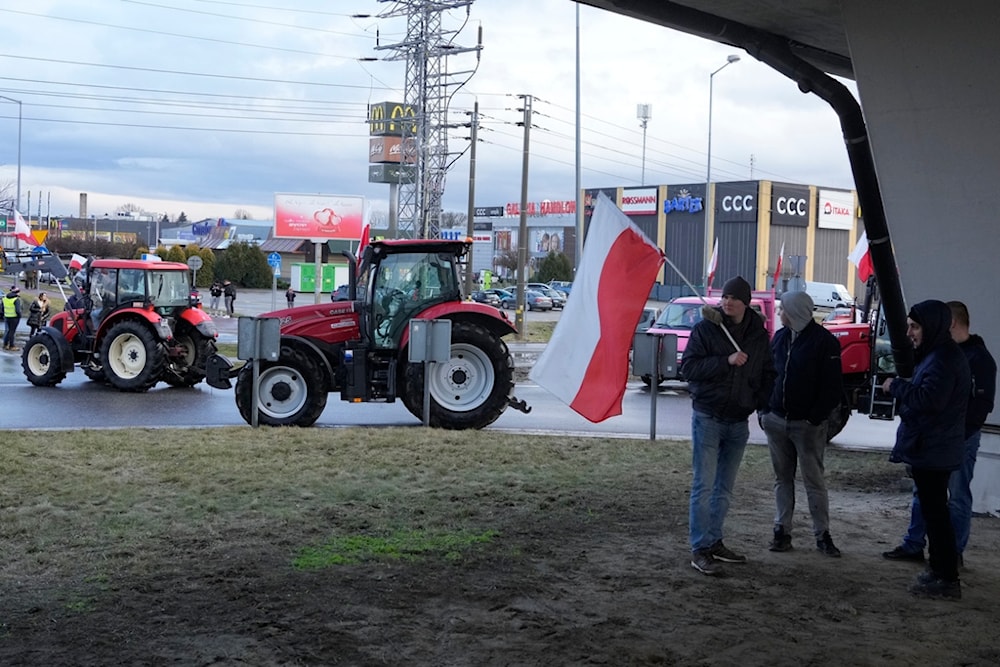Ukraine's PM faces no-show from Polish officials amid farmers protests
Jan Grabiec, Chief of Staff to Tusk, informed reporters that Warsaw had decided not to dispatch a delegation because holding a meeting "makes no sense at the moment".
-

Polish farmers drive tractors in a convoy in Minsk Mazowiecki, Poland, on Tuesday Feb. 20, 2024, as they intensify a nationwide protest against the import of Ukrainian foods and European Union environmental policies (AP Photo/Czarek Sokolowski)
In an effort to address the ongoing protests at the Ukrainian-Polish borders, Ukrainian Prime Minister Denys Shmygal on Friday traveled to the countries' borders where he was supposed to meet with Polish officials.
However, Shmygal reported that no officials from Poland's side came to attend the meeting, noting that work is still underway to address the situation.
"Unfortunately, Polish government officials did not come," Shmygal told reporters. "But we publicly appealed to them, gave our proposals, and will continue this work."
Shmygal added that Ukraine had been in communication with Polish Prime Minister Donald Tusk and stressed the urgency of resolving the crisis "as soon as possible".
The government team visited the Krakovets checkpoint on the border with Poland. Ukrainian grain does not reach 🇵🇱 market. We want Polish farmers and Polish society to hear this. We are offering 🇺🇦's plan to open the border. It is a plan of mutual understanding consisting of 5… pic.twitter.com/8m32rNw9XN
— Denys Shmyhal (@Denys_Shmyhal) February 23, 2024
While Poland remains a steadfast ally of Ukraine in its war with Russia, recent tensions over farming issues have strained relations. This includes farmers blocking three border crossings in protest against the low prices of Ukrainian grain and other agricultural products.
Ukraine's head of state Volodymyr Zelensky suggested the border meeting and issued a statement indicating that Ukraine's grain was not supplied to the Polish market "at the request of the Polish side".
"We are willing and will do everything to resolve this issue," he added.
However, Jan Grabiec, Chief of Staff to Tusk, informed AFP that Warsaw had not dispatched a delegation because holding a meeting "makes no sense at the moment". He added that both parties were "far" from reaching a resolution to end the standoff.
"Unfortunately, there is not yet a Ukrainian proposition that allows to hope for an end to the deadlock in commercial relations," Grabiec said.
Read more: Kiev says Polish border blockade threatens Ukrainian security
The government in Warsaw has been cautious not to provoke Polish farmers, as Tusk informed reporters on Thursday that negotiations were ongoing. He mentioned that the two governments have scheduled a meeting in Warsaw on March 28 and emphasized the importance of continuing discussions at a technical and organizational level.
On Friday, Polish authorities reported that Ukrainian grain had spilled on a Polish railway near the border, marking the second such incident this week.
Why is this happening?
The core of farmers' grievance lies in the exemption granted to Ukrainian truckers from acquiring permits to cross the Polish border since February 2022, making their services more cost-effective and appealing to customers.
Moreover, farmers in neighboring countries have complained about product surpluses affecting domestic prices.
In September 2023, Poland, Slovakia, and Hungary decided to impose their own restrictions on Ukrainian grain imports after the European Commission opted not to extend a ban affecting Ukraine's five EU neighbors.
So far, Poland has still not lifted the ban it imposed on Ukrainian grain imports but has not yet felt any consequences despite having violated one of the basic principles of the EU's trade policy, according to Polish newspaper Rzeczpospolita.
The report further stated that Kiev has still not withdrawn its claims with the WTO over Poland's ban on Ukrainian grain imports.
The European Commission proposed extending tariff-free entry for Ukrainian agricultural products for another year starting in June, but with a number of measures to protect Europe's own farmers.
The WTO case is still open, and the dispute remains unresolved, despite the European Commission's recent move, the report notes.
Read more: Polish FM worried about farmers using pro-Russian slogans in protests

 4 Min Read
4 Min Read








